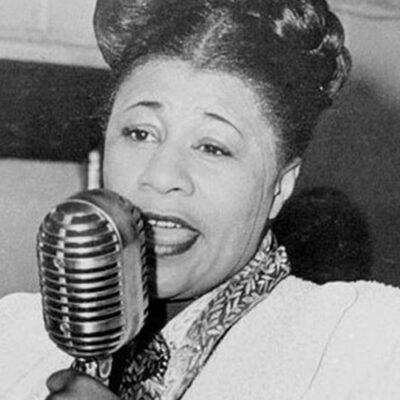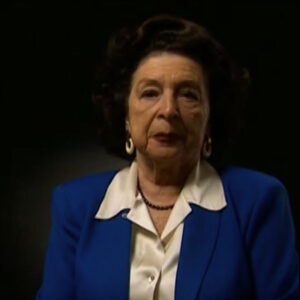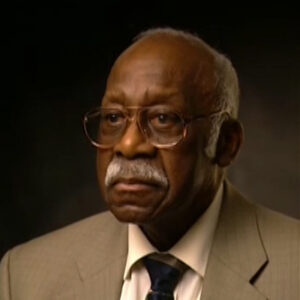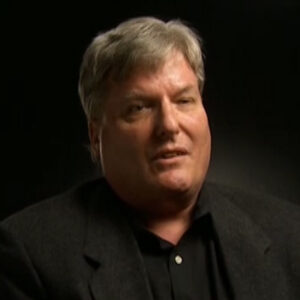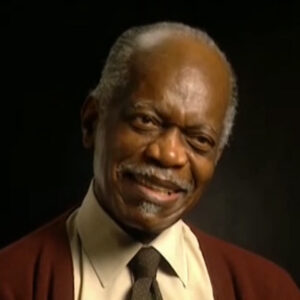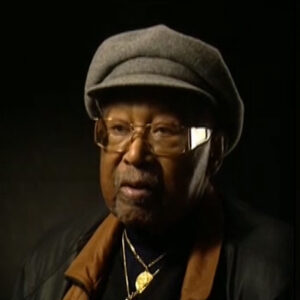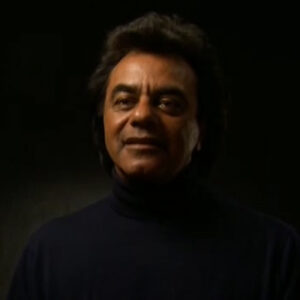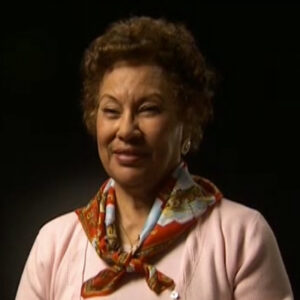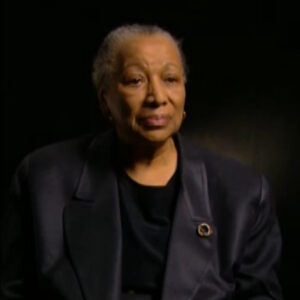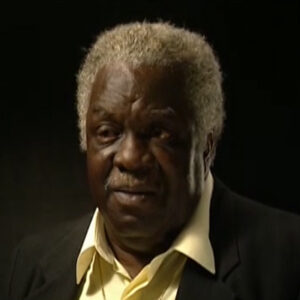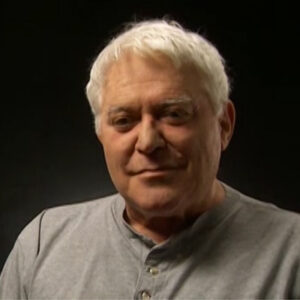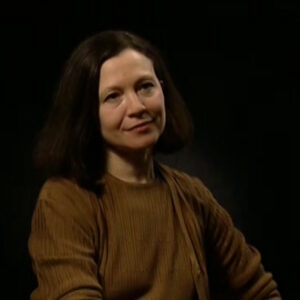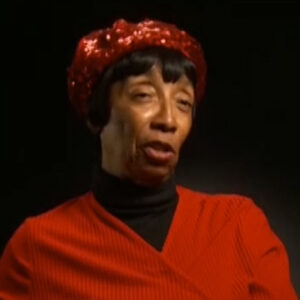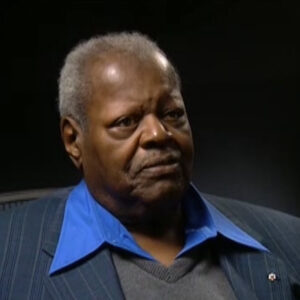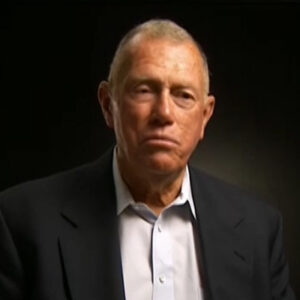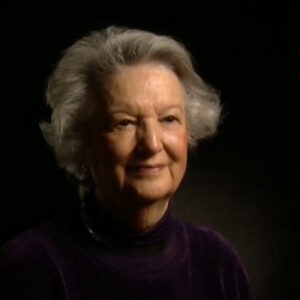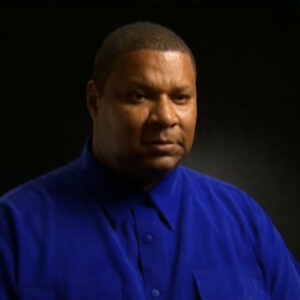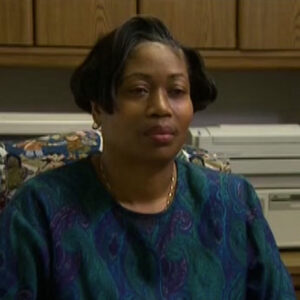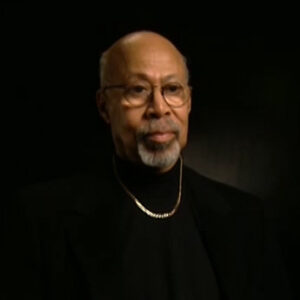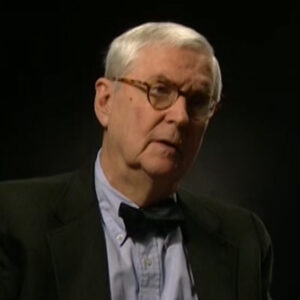Speaker Time you, Rachel. Let me see that, please. Sure.
Speaker OK, the framing is a little bit I think he’s too centered in the wide shots. Sure, no problem.
Speaker You get me as far back as past years that you’re a center right now. Of course.
Speaker OK.
Speaker Just describe to me what what would you characterize your relationship with Alan?
Speaker Well, I initially was a fan. I started listening to Elle in 1960, and eventually she heard about me probably from her road manager and from her traveling companion. And eventually I became a friend, and it was because she actually sought me out. I think I better stop. Let’s start over something. I don’t know how far in detail you want me to go or. Or what.
Speaker The question really is about being a fan of. And, uh, you’ve said things like you were such a fan that they put it in your high school yearbook. Uh.
Speaker Yeah. But, of course, that didn’t happen where we are now or not now.
Speaker Yes. It’s just kind of strange. Again. When you come to sort of.
Speaker Now, certainly, you know what, give me some tape players, like a nice big piece you would. It’s also it’s around here. Just a. I know what it is, is that it’s staying down. OK. Thank you. Yes. Yes.
Speaker You want me? If you ask a question, I need elaboration on it. Can I do that?
Speaker OK. Let’s do it that way. That’s it. When did you first hear about.
Speaker I first heard Ella, and in May of 1960, I’d heard that she was considered the best, quote unquote, the best. And my parents had a friend, Fred, a son of a friend of some friends from Beverly Hills who had come over to our house in Palo Alto on Sundays. He was a Stanford student in study and he was a he was a big fan of. And so he brought one of her albums over and. That was it. I heard that album, he let me keep it for a week, and I played it and played it and played it, and almost instantaneously I became a big fan of Alan. So the first time was when I was 15 in 1960. When he first actually heard The Voice and was listening tour.
Speaker And when the first time you actually saw.
Speaker What was interesting, I started buying her records, I, I bought her the five Gershwin albums and the Gershwin songbook. Then I bought the Cole Porter songbook and I was constantly from May of listening to and starting to buy the records. I was constantly haranguing everybody, telling people to listen, including my parents. And I remember one time my parents were talking and. I tried to get them to come in and listen to some ELO records, and she just happened to be coming to the Fairmont in November of 1916 and my dad said, I’ll take you. So in November of 60 was the first time I saw her.
Speaker So this is a fairly unusual thing for a teenager, right?
Speaker Yeah, I’m afraid so. It was, but I tell you, I never was a rock and roll or this was, you know, 1960s pre Beatles and all that. I was always the music. I always liked music, but I liked classical music. I wasn’t exposed to jazz. But Peter Gunn, which was Henry Muncey’s show, I mean, he played did the music for Peter Gunn in the nineteen fifty nine. And I started listening to that and that kindled my interest in jazz. And so I was listening to jazz, I was buying Duke Ellington and Dave Brubeck. And so that’s when I decided I wanted to hear some singers.
Speaker When you went to the Fairmont, you saw Elodie and her crying.
Speaker 1960 was a good time to see you. Yes. I mean, she, as far as I was concerned, was always good and great in great voice. But yes, 1960 was her prime. And I actually got her autograph that night.
Speaker I went up and talked to her. I told her I had seven of her records and maybe it was more 10 at the time, I don’t know, and she signed her autograph, my autograph book and all that. So I did talk to her that night.
Speaker Nobody says so unapproachable.
Speaker Well, I’ll tell you, at that point, I didn’t. I hadn’t read that much about her, so I didn’t know what to expect. She was very nice to me. I was fifteen. So I had no problems. So she was approachable. I mean, she didn’t spend much time.
Speaker She was going up to her room, but she signed my book and talked to me a little bit. So it was. I’m very glad she did.
Speaker You also described a. And you and you went there. What was that?
Speaker In 1968, I was in my second year of law school in San Francisco. And I saw a small article in the paper, Alawi’s was appearing at the Fairmont again at that time. I saw a small article in the paper that she was gonna be down in Hunter’s Point area of San Francisco. There was a Safeway store that had been bought by it was a consortium of black capitalists at that time. And it was going to it was a new thing in San Francisco. So she was going to be out there walking through the store and everything. So, of course, I went to the store with my camera and took pictures. And she was very approachable at that point. I didn’t really spend much time talking to her that day, if at all.
Speaker But there I recognized her traveling companion, Arly Small, who had always been with her and her road manager, Pete Cabala. And I started talking to both of them and a friendship started between the two of them. And that was from that day in 68.
Speaker So how did you go from family to friend?
Speaker It’s it’s a long story. Suffice it to say that over the years I continued to see her. I would travel all over, if I could to see her. I kept up my relationship with Arly and Pete.
Speaker And so consequently. I guess Pete and Arly started telling her about this fan that kept showing up. I didn’t really believe that they had talked to her, but they said they did. And so I think she kind of knew who I was. I didn’t ever try to meet her because I knew the way she was at that point. So whenever she was in public, if I was waiting for Arly or Pete, I would get behind posts. I would get behind a corner so she wouldn’t see me because I was afraid she’d say, Who’s that?
Speaker What’s he doing here? So I actually went out of my way to not get to know her. And. Slowly over the years. With my trying not to get to know her and with Pete and Arly talking to her, she finally. Knew who I was and didn’t. That was about 78, 79. When she actually when I was actually introduced to her and she knew who I was, that she was Jim Blackman, who was a fan that followed her around.
Speaker And from what Arly told me, and this was before I really got to know her well. She would go around and tell people she had a fan, that she had lots of fans. But she knew about this one particular fan that would go all over to try to see her and.
Speaker So it was what happened in 1980. I was going almost every night to see what the Fairmont. In New Orleans, I lived in New Orleans at the time. And.
Speaker She started introducing somebody in the audience one night and she went on and on about this person who she had seen so that they had seen her a lot. And all of that. And I thought, well, what do I do? That could be because it be interesting to talk to this person. And then it dawned on me she was talking about me. And the next thing I know, she said, stand up and take about Jim Black. And of course, I didn’t know what to do. So I just kind of meekly got up and turned around and waved and sat down. And that was the first time she really acknowledged me in a show. And I was disconcerted, to say the least.
Speaker Why do you think he would do that?
Speaker I think Ella. Galahad has had no ego. She didn’t. Realized how important she was. And I think the fact that somebody that she knew of there actually would actually be seeing her. Over and over, she couldn’t understand this. And I think she.
Speaker She thought it was so interesting that she was willing to share it with the audience. And she did that quite a few times. She would do that in concerts. I wouldn’t stand up in a concert hall, but she’d say, Where are you, Jim? I wasn’t about to get up, but she introduced me in clubs quite a bit.
Speaker And I’d have to stand up and all that.
Speaker During the time that. You didn’t really know her.
Speaker You didn’t get to know early very well from 1968 until she died in 1980. And also Pete Kavala was road manager. And I knew him until, of course, he died in 1990. So I was very close to Pete.
Speaker Well, what did she do for me when I this was when I first met Arlene Pete in 1968 at the Safeway. Charlie, I guess, recognized me.
Speaker And I don’t know why, but she kind of took me under her wings and she said, well, I tell you what, Jim, why don’t you do this? She says, I will. At the Fairmont, we walk in front of the room. We go through the kitchen. I put along the stage. So why don’t you stay outside in the hall? I’ll put Elon’s on the stage. I’ll get you and we’ll come and sit on the windowsill. So I thought, you know, I couldn’t believe that so. The next day I call and we did the Windows routine. And after the first show, I thanked her and I was ready to leave and she says, Oh no, you’re staying for the second show. I was like, you know, I didn’t want to do that, didn’t take advantage of a situation. She said, Pete, come here. She introduced me to Pete. At that point again and take Jim out and buy some drinks. So that’s that’s actually what happened. And early on, you know, I developed this relationship with Arlene and Pete and Pete would sit and talk to me and tell me all these stories.
Speaker And we had a very close relationship. And I became close to his family and his wife and all of that many years before I knew Ella. And he knew that I. Never tried to. That’s an over because I knew I never would. Because she was so private. And. So I think in part, the fact that I was just the office that I was very reticent about. Trying to establish a relationship. I was very happy with the relationship I had with Peyton and Ahly and. They were wonderful to me.
Speaker These people are really necessary. Absolutely. Well, basically what they did.
Speaker They both told me that this was on the road, that Kate would take care of the business aspects. He would do interviews and transportation and putting her on the stage, musicians, the lights, dealing with the maitre d, dealing with the public. And Charlie was just there as her friend. She would be there should dresser should talk to her.
Speaker They’d have dinners, all meals together, things like that. She’d go shopping with her. So just a friend, somebody traveling companion.
Speaker Was was kind of like the.
Speaker Well, absolutely. I found this out when I got to know her and.
Speaker Ella was very focused. She was very calm. She could do one. Only one thing at one time and she’d do that with all of her energy. She would she would sing. That would be it. She would have a conversation. That would be it. She didn’t like distractions. So consequently, Arlene Pete, one of the things that they did was to eliminate all these distractions from Ella’s day to day existence. Consequently.
Speaker There was calm with Ella. But around her was this constant movement and craziness that was going on, which a lot of times she didn’t even know about. And it was comical.
Speaker Well, it was comfortable because she didn’t she. She tried to stay away from it all. And yet it was involving her and. And a lot of times very personal things, you know, going on interviews and doing this and doing that. So it just. It was ironic many times that these things would happen and. She would be somewhat unaware of it and unaware of things happening. It’s kind of hard to describe.
Speaker Did you know that had you become friends with Ella at the time the early died?
Speaker Actually, that’s a yes.
Speaker In 1980, when she started introducing me at the Fairmont in New Orleans. That’s when. I knew that Elliott knew who I was and we’d started to develop a relationship. I knew that Ella was going to be in Toronto at the Royal York Hotel in April. Of 1980. So I plan to go there and surprise. I would always tell Pete that I was coming. But I would surprise Ella and Arly. And so I’ve made arrangements to go to Toronto for a week. And. The week before I left, I got a note that Charlie had died. And so I was very upset. And I went to Toronto. I ran into Pete the first night and he says, come to the dinner show tomorrow, I’m good. Ella wants to see you. You know, she was very upset. We couldn’t find you. We didn’t know what your address was or anything. So the next day I went to the to show. And Pete brought me back and made it, at least for me. She started crying and she because that she had found out that I was very close to early also. And. So I asked her if I could call her. And so I talked to her on the phone about Ahly and. Then she invited me to lunch. On a Saturday afternoon. Well, I thought she was just being nice. And I didn’t want to. He put in the position of. Go into her door and have it open the door and saying, what are you doing here? So I thought she was just trying to make a nice gesture and so I didn’t. Go to lunch. I did call her later that day to say goodbye because I was leaving the next day. She told me that she had been waiting all afternoon. For me, she had a chicken salad sandwich for me. So I was kind of upset about that. She at the time had a friend named John Norton, who had taken over for Arly Small as a temporary traveling companion until he could find somebody that could do it on a permanent basis. And. So I had talked to June and, you know, started to maintain really, you know, develop a relationship with June. So that was in April. All right, Al, when I was on the phone with our allies said. Well, you have my number in Los Angeles, don’t you? Says, no, I don’t have your number. She says she gave me your phone number and she said, next time you come to L.A., call me up and come on over for dinner. So I said, OK, I would. Well, of course, the next month was June came along. Alawi’s in Houston. So I went over to Houston for the weekend. She had four concerts and you, Norton got me on the side and said, call me up. So I called her, she says, look, baby, Ali doesn’t invite anybody to do anything. When she invited you for lunch in Toronto, she was serious. She wanted you to come for lunch. She said she’s going to invite you for dinner. After the show on Sunday afternoon. And I would highly suggest you say yes. So, sure enough, Elliott invited me for dinner and I had dinner after the show. And then in December, I went to Los Angeles and went over to her house for the first time for dinner. And that’s how it started. Then I started every time I was in L.A. I’d go over and have dinner.
Speaker Those is pretty extraordinary. You really did run around from city to city to city. Did did you see any other Ella Fitzgerald fans doing that?
Speaker I found out that there were quite a few. But, of course, you know, people run from different cities to different cities and I was usually with Pete Norelli. And so I you know, I didn’t know there was a network or anything out there. So I didn’t really run into the same people.
Speaker No. No, but it’s still it’s unusual, to say the least. Yes.
Speaker Going to the house. I mean, she’s the kind of person.
Speaker So there we go. I hardly get any accounts of what she was like at home.
Speaker Early on, I had to disassociate myself with the. Icon. With the with the actual person. The first time I went to her house. I was obviously a wreck. You’ve got to understand, I had idolized this woman for a long time and I had seen her many times under many circumstances. I by then knew that she was very private and. And yet I was invited to her house for dinner, not knowing what to expect. I’ve never really spent time with Rona one on one basis. There’s always been somebody around. And so the first time I went to that front door, I’ll never forget.
Speaker I just sat there and hyperventilated for a while and then she came to the door. She said, what would you. Can I get you anything nice said, I’ll take a beer. And for the first and last time she went, got me a beer and we sat down in the living room for the first and last time. We always sat in the den after that. And finally I said, look out. And I said, Do you mind? I said, this is a museum to me. And I just look around and she says, Sure. Go ahead. She was down to earth and and just the opposite of what she would what you would think. And I think the reason is if she felt comfortable with you. She was fine. I don’t think she felt comfortable with that many people.
Speaker Especially in a group. But on a one to one basis. From the start. She. Was honest with me.
Speaker She trusted me. Talk to me about a lot of things. I eventually. Should ask my advice. Sometimes fairly major things.
Speaker The truth should be that what? Let’s just hold off.
Speaker When I was doing the Smithsonian, obviously, I didn’t want to say a lot of things that because I didn’t want them being put in to give you an example of one of the things that I told the Smithsonian about the Sinatra thing. Remember when she said that he had called and wanted her to. Now, I don’t know if I should put that in, because Norman might get all.
Speaker Stuff about that, I don’t know. Maybe I just do it with an. Well, you know, because he didn’t speak for speak reference for six months. Yeah, OK, that’s fine.
Speaker I’ll just do it. Yeah, I’ll just I’ll just. And then another thing. Do I have to say so as to what’s going to be used? I mean, I not completely, but your say so, huh? If I decide later that I said something that I really didn’t want to have put in.
Speaker Well, we don’t close the door.
Speaker I’ll just talk I’ll just talk to you, Charlotte, I’ll just tell you what you ask from the questions on line three.
Speaker You think it’s said than. I think ultimately you have to.
Speaker You have to see it in context.
Speaker Yeah, exactly, yeah, yeah. Yeah. Yeah, you’re right. Thank you. Oh, that time.
Speaker Okay. The. She did.
Speaker Well, you know, I got over the period of time I would spend. I would try to get down there at least every three months and I would be on the phone. I’d try to call about once every month. And then I kept in contact with Pete and and things like that.
Speaker So over the course of time. By then, we had had you friendship of shared experiences.
Speaker And by the time that I really started spending a lot of time and staying over and everything, I was I was trusted. And so she would she would ask me things any time an album came out, for an example, she’d want me to come down and listen to it and be critical about it. Her last album, for an example, which was never released. She played for me the day before Sinatra got the Ella Award, and that was in December of 90. And she sat there very critical. Listening to it and but she wanted me to hear it. And what I also would do this is off the subject, but I would when we’d sit in the den, I would pull out her records that she had never heard because she was too busy recording and going around the world and make her listen to her own records, most of which she had never heard. We still get into arguments about what she had recorded one time when the Harold Arlen songbook was rereleased. They included Ding Dong the Witch is Dead, for an example, which had never been on the original albums. And so I came down and told her I liked. Her ding dong the witch is dead. I never recorded it, she said. I said, yes, she did. No, I didn’t. I said, I’ll be back. So I went and got in the car, went to tower, bought the album because she didn’t have it.
Speaker Put it on. Now, did you record? Ding dong. The witch is dead. But. She would tell me things that happened one time I was down and she.
Speaker Said that Frank Sinatra had called her and wanted her to do a concert for Sloan Kettering every year. Sinatra would do a charity benefit at Radio City Music Hall to benefit Sloan Kettering Cancer Research.
Speaker And Frank had called the office and the office said, oh, Ella would love to do it for seventy five thousand dollars. So he called her at home.
Speaker She says, Can you believe anything so ridiculous? Seventy five thousand dollars. Frank wants me to do it. I said, Well, she says, you know, in this business, you know, you do something for somebody. Somebody does something for you. Seventy five thousand is the most ridiculous thing I’ve ever heard. I said, well, do you want to do it? She looked at me and she said, yes, I want to do it. I saw them wanting to use golf ranks, and I can say you’re going to do it. She called him the next day she did it. And from what I understand. Norman didn’t speak to her for a few months. He was furious that she had she had doubts she wanted to do it and she did it. Things like that.
Speaker But that brings up the whole question. She seemed to be very much controlled by the office and Norman. Did you see that?
Speaker Constantly, all the time, it was it was very clear. Ellen liked it and she didn’t like it. It was paradoxical in the sense that she always felt that she couldn’t make any decisions. And yet when she would be put in the position to make a decision or at least.
Speaker Give her input. She wouldn’t do it.
Speaker She didn’t want to be put on the hot seat. I saw quite a few instances of that professionally when, for an example. One time someone called her at home and asked why he wasn’t with her working with her any longer. And she said, well, the office does that, it’s not my decision, but I heard that you had done a few things and. Bah bah bah. But I mean, she she clearly didn’t want to have any part in the decision making process, and yet she would complain about it. She would say, I want to do an album of children’s songs or I want to do an album with. I think she wanted to do it with Mel Tormé and things like that. And also when she when she sang the songs, she really didn’t have much of a chance to. She was in many of the songs. I think that was mostly the producer who chose the songs and the arrangers and all of that. So Ella did have input. I mean, I’m sure they gave her a bunch of songs to choose from. But the long and the short was that the decision was done by Norman as to what she was going to record, where she was going to play.
Speaker She didn’t know where she was going. Half the time, she just got in the plane and went. So and even in her personal life, that was the case. She didn’t want me to. Tell the office, for an example, that I would be coming down and staying with her. Don’t tell the office they don’t need to know my business. And then I would hear it through the grapevine. That I couldn’t be controlled because the.
Speaker Because I would go over there without going through the office.
Speaker And I came back, you know, on numerous occasions to me. So I wouldn’t call the office and then they’d find out later I’d been there because Ali would say, well, Jim was here this weekend and did.
Speaker They’d be upset because they. They weren’t in that position of control.
Speaker On a personal level, also, if something would go wrong in the house, they’d call the office. The office would be called. So you say she used it. When she wanted to and. Didn’t use a bit. Throughout her career, Ella’s not Dumond’s was not demonstrative.
Speaker She.
Speaker Had people around her, as I said before, that did everything for her so that all she had to do was sing, spend her energies.
Speaker In singing, communicating with the audience.
Speaker That was the reason on d’être for the road manager, for the traveling companion, for this whole group of people that surrounded her and insulated her from the outside sources.
Speaker What were they protecting? They don’t have friends, Draffin. Without calling the office. Why? Why did they feel the need to do that?
Speaker That’s the 64 dollar question. But a lot of it has to do with with Ali’s personality, I think on the one sense she wanted to do what she wanted to do, but in the other sense, she didn’t want to. As I said before, you have to make decisions and deal with things that might be unpleasant.
Speaker And so consequently, the office did all of these things. For her, but the office was very protective of her. The one thing about Ella that you’ll find when you talk to a lot of people for some reason, and I don’t know why. Even an audience can sense it. You have this feeling that you want to protect her.
Speaker Whether it’s her childlike nature or. Or her vulnerability or or what it is you just had, that since you wanted to put your arm around her and protect her from from anything. And you read accounts early on with the musicians. They called her cysts. They didn’t think of her. They thought of her as their youngest younger sister, and they wanted to protect her. It was just something in her character that.
Speaker Caused people to do it. And consequently, they did. And coupled with the fact that she didn’t deal with any disagreeable things, if there was anything negative that came up, she would put it away. She didn’t want to deal with it. So in a business like this, she was in. You have to do with many, many difficult things. You have to deal with contracts.
Speaker You have to deal with with musicians.
Speaker You have to deal with the rain. You have to deal with all these things. It’s consequence. There’s going to be fights and, you know, just problems. She didn’t have to deal with that. All of that was taken away from her. And that was her own choice. So.
Speaker I think that.
Speaker Slowly, with the office, she became more insulated. More protected than the audience. The office wanted to. No, what was happening on a daily basis, on a daily basis. And wanted to make sure she wasn’t doing things that would go against what the office wanted, for an example, interviews on the road.
Speaker Supposedly, they’d have to go if you came up to Allah and said, I’d like to interview you now, should do it. But if you told her that she had an interview in three days, she’d say, why do we have to have those? And should fret about it for three days and then you get mad at Pete. The office had set it up and Pete would have to take her to the interviews. Once she got to the interview should be fine. If she was comfortable. What she usually was, I saw uncomfortable a few times, but.
Speaker Did she, in fact, have a child like.
Speaker Yes, very much so. Even physically, when she waved goodbye should go like that. She you know, this is a little little girl goodbye. And she had a very hesitant voice and all of that. And she was. And I’m not saying childlike in a negative sense. I mean, she just approached everything very deeply on an emotional sense. And if you want to call that child like, that’s OK. I just I call it innocent. Whenever she would see. Pictures of war on TV, for example. Should need to start crying or turn it off whenever she heard anything about any children being hurt.
Speaker She would she would cry. She felt things very intuitively and very deeply.
Speaker And she reacted on that basis.
Speaker She would. If she she got mad at you for saying something, should she get mad at you right then and there, she wouldn’t hold off and she’d get mad. And later say, I’m sorry, I’m over it and all of that.
Speaker So. And again, I don’t want to use the word. Simple. I think she was really an innocent. And I think that’s why she could. Sing the songs the way she sang them. She has this incredible innocence that. Poignancy and directness that. Comes across, ironically, after dinner last night, I brought down the Gershwin songbook and. The last.
Speaker They just rereleased it. It’s four cities on the last C.D. They have alternate takes of lady be good. But of course, that was her fast number, but she was seeing it slow in the Gershwin songbook. There were four takes.
Speaker Each of them different.
Speaker I couldn’t say either of them, any of them were better or worse than the other, they were all equally as good, but they were different.
Speaker But they still had that poignancy and that that that directness, even though she did different things with with the notes. She approached things on a.
Speaker The basic level is kind of hard to describe, but it can’t throw under singing. Her personality came through in her singing. And I think when an audience saw her.
Speaker When she was talking to the audience, her personality came through and the audience also had this incredible. Love and empathy for her. It just came across. And she had that. Up at the beginning of the career when she was young and she had it at the end of her career when she was still young.
Speaker She can, she can. Take an audience and just sing to them directly, it’s because they they trusted her. They trusted her.
Speaker Well, I just want to say something else, she was known to be very generous. Particularly with her family. To talk to you about that.
Speaker Yes, and I mean, it was very generous, a very, very generous person.
Speaker She did lots of things for lots of people that that people don’t know about.
Speaker She helped her family a lot. I mean, she was very good to her family. She was good to her friends. She was good to her musicians. Ella would go to the Fairmont. And stay for two weeks. And at the end of the two weeks, every musician would either have a sweater or a bracelet or whatever and cards from her.
Speaker She was very, very.
Speaker Appreciated of them. But she was also very, very nice and very generous with her family and with her friends. It’s very generous to me.
Speaker I can understand the. Gifts, friends, musicians, things like that. That’s. But she took on an enormous burden of family members.
Speaker Was that just something obligated to do, as I told you, Ellas.
Speaker Reacted always from the heart when her sister died and 60 was 65. She had three children, her sister and three children.
Speaker Elway’s and. Karen Ann and Janice, who lived with their mother in New York.
Speaker Alan brought them all out. Janice was about. Twelve, I think, and Karen was four and Elway’s was 17 or 18. She brought them out and raised them with Ray. She raised them. Karen told me she doesn’t remember her mother. And so they weren’t really her nieces. But Ella considered them her family. She she that was her family.
Speaker We actually talked to Ray Brown Junior yesterday and. I’ll tell you what happened. I asked him if he ever wanted. Once you kind of sit down, if you ever wanted to find out this mother.
Speaker As far as we know, his mother was Ali’s sister. Peculiar to me that. He would not have been told that.
Speaker Did you tell him that had he heard that? Oh, you’ve got to read it. It’s been printed, published several. I was kind of stunned by. You think he doesn’t? No, I don’t.
Speaker I don’t know. I don’t know. I know when that came out of the Stuart Nicholson book.
Speaker I don’t know if it’s true or not.
Speaker I obviously never would bring that up with her. Talk to her about it.
Speaker If she wanted to talk about things like that, she wouldn’t she would sometimes and then would go with it. But I certainly wouldn’t bring anything like that up with her.
Speaker I’d actually forgotten that. Yeah. That’s that’s true. I mean, that might be. That might be true, that it was her sister.
Speaker It might not be. It might not be true. It might not be clarified.
Speaker Maybe you can find out. But the person that’s going to be after me.
Speaker Yes.
Speaker He’s a big guy. Oh, no. Oh. Early on in her career, they began to create the L-A story, the. That myth, exactly. But you know, the public relations story. But we found out that things were not so wonderful when she was a kid. Did she talk to you all she.
Speaker No, she didn’t. What about the unpleasant things? Eliot wouldn’t talk about unpleasant things. And if they were unpleasant, things should make them comical. She would make a joke of it or something like her first marriage and all that. I heard the stories from her that are the stories that I had read. And I’ve said before, and I think it’s true that it’s like anything else you over a period of time tell a story and it changes. And slowly you start believing the latest story and then you add to it. So consequently, I think there is a germ of truth to most of these stories, but I don’t necessarily think that they’re as simple as she would like like to make it. She always told me she had a very loving family. That her stepfather taught her on the guitar. He was Portuguese. She learned a little bit of the language. She lived in a mixed neighborhood. She didn’t ever remember being called the N-word until she was eleven, which is an interesting story because I read it. But she told it to me that when she was around 11:00, this girl had called her the N-word and. She supposedly said to one of her friends who is Italian. What does that mean in the end? Her friend told her. And Ella realized that she was in a position that she had to do something. But she was tall and thin and gawky and didn’t know what to do. So she said the only thing I could do would be was to go over to this person. And she went over not knowing what she was going to do. And she tripped and she tripped on the person that had called her that word. And she said once he was she was down.
Speaker She says, I beat her up and she says I was the class heroine after that.
Speaker Now, it’s hard for me to believe that she was eleven before she heard that. Especially living in the mixed neighborhood. But that’s the way she. Chose to tell the story. And she also told me about the when she first got married to Bernie Kornegay, that when she went to court, when they were doing the annulment, that the judge pointed his finger at. Bernie Kornegay said, you can’t stay away from little girls, and he told Ella to you just keep on singing task at a task. Now, that’s the way she chose to.
Speaker Tell the story. Kind of kind of a comical aside, you know, a comical way.
Speaker Did you know otherwise?
Speaker Well, no, I didn’t. I mean, I just. She would tell me the story and so I would. You know, there’s a kernel of truth to it. I mean, it might be the true story. I don’t know.
Speaker The court notes that.
Speaker Well, I know she did. I mean, from the book. Subsequent to the time that she told me the story, I found out from that book that from Stuart Nicholson. She also would bring up and yet she would bring up things. I was playing on Hello Love One Time, which is an album with Frank Devall.
Speaker So. Lovesongs and.
Speaker Now I’ve lost. What’s the what’s the. I’ve lost in a fog. The plane lost in the fog. She says, you know, I was booed off the stage with that song. Well, I had also read that when she first was doing the amateur contest, she went and did it. And watch your show one time. And the pianist didn’t know the changes. She got lost and she was booed off the stage. Now, she’s still brought that up for 50 years later. You know, I was booed off the stage.
Speaker The insecurity. The incident is.
Speaker Alawi’s. Ella was completely and totally insecure.
Speaker That’s why she didn’t see the humor. That’s why she was like the eye of the hurricane. I was telling you about. She didn’t see the humor in it because she was too insecure.
Speaker You.
Speaker Very funny story about.
Speaker Oh. One of the last times I saw Ella, it was in March of 93. And we were sitting in the den and we were talking about something I don’t quite remember what it was. We got on her career and she looked at me and she said, you know, she said, I don’t understand how this career has gone the way it has or why it’s been so long. She said there’s other singers that have far better voices than I do. She said, I just don’t understand how this career was going on for so long. And she looked to the side, looked in the backyard and turned around, looked at me as if she had finally figured it out. She says, I know what it is. And she took her hand and put it down on the table. She says, it’s the songs that I sing.
Speaker That’s what the public likes. It’s the songs I sing.
Speaker Now, I just sat there incredulous and I just, oh, what could I do? I just shook my head. I mean. What do you say to something like that? That’s the way she. She explained her career to herself. Nothing to do with how she sang. Her voice rephrasing her genius.
Speaker Now it’s the songs that she sang. That’s what made her career.
Speaker References to how life or. She’s going on saying she would say like to false.
Speaker All the time. I mean, every always before performance, you would want to talk to her. She’d be very nervous. And if she heard that somebody was in town. Like one time Sarah was in town. Oh, Sarah. Everybody’s gonna go see Sarah. Nobody’s gonna come see me. Now, she. Oh, she. She broke the records at the Venetian room every night for two weeks. But she had that in her head that everybody was gonna go see Sarah. And it’s it’s not apocryphal. This actually happened cause I saw it happen. Ella. Couldn’t see two feet in front of her, but she could see two seats in the back row of a 10000 seat auditorium that were that were empty. At one time we were going down to and it was sold out. You said it was sold out. I saw some seats that were empty.
Speaker We were going down to a concert in Costa Mesa in Orange, Orange County. And it was sold out. I had heard that it was sold out and. Ella got a room because she wanted to rehearse. She hadn’t been singing that much, so she wanted to rehearse.
Speaker So we did the rehearsal and I was sitting in her room between the rehearsal and the show and I’d been telling her it was sold out. Well, of course, you know what’s going to happen. They had the news on and they said jazz legend Ella Fitzgerald is here. Tickets are still available. She looked at me. I said, Oh. I said, Ella, it’s really sold out because it was.
Speaker And she looked at me and shook her head. So she just had that she says, you know, we’re used to selling selling the place out to L.A. You do sell it out.
Speaker This insecurity. I’ve been told that people were talking about it all the time.
Speaker Yes, I told you before she liked the one on one conversation. And so when there are a lot of distractions. She didn’t like it, but on numerous occasions I’d be talking to Keiter or to Pete or something. I remember one particular time there was a private concert at the Four Seasons here in Beverly Hills. Think it was five thousand dollars, a couple to four doctors. And before the concert, a bunch of us were sitting around talking. I was talking to Kiran and Ella was by herself and we were laughing. And all of a sudden I heard this.
Speaker Hey, are you all you all laughing at me?
Speaker No, well, we weren’t even talking about you, but she said that all the time, if somebody would laugh and she didn’t know why they were laughing, she would think they were laughing about her.
Speaker Stop in America. You know, I’d like to take a break. It’s a very short cut.
Speaker Maybe it’s a quiz, a moat or something. All right. By bye. Roger.
Speaker I want to tell me that story you just told about. Going to pull this off.
Speaker Oh.
Speaker As I said, Ella was always concerned about the number of people in an auditorium and and all of that, she had a very strong ethic about her and she thought some things were right and some things were wrong. She was performing up at Paul Matsson, which is in the hills of San is A and it’s an outdoor venue where there’s no assigned seats and there’s lots of space for many people, but they only sold X number of tickets. And I was going up with her in the limo from the hotel and so I would go and sit in the audience.
Speaker And I told her that I didn’t have any tickets because I didn’t need any tickets because I was with her. And it was not assigned seating. So I’m in about the sixth row. And in the middle of a concert, she looks at me from the audience and what are you doing out there? And I kind of went down in my seat and didn’t say anything and stayed there, and then after the show I explained to her, well, you know, all of this is open seating. You know, people are sitting over in the sun. I mean, when it’s sunny, they’re sitting over here. And there were lots of places.
Speaker So I thought I satisfactorily explained it to the next day, I’m sitting in the sixth row. She looks up after one song, says, what are you still doing out there? So I thought, well, I guess she didn’t understand or whatever. So the next day. They had a bush, Laura, next to the seats.
Speaker And I stood behind the bush so she could see my head and I was in the sun. And then she started dedicating songs, I’ve got a song that I want my friend Jim Life that’s dedicated to my friend Jim. And all that. So she was happy seeing me standing in the sun, not sitting down at a chair, which.
Speaker Would have been available. That’s the way she was.
Speaker What have you said to her? Complemented another senior. You know, as I said, Ella.
Speaker Was. Insecure. Now. She knew. What efforts I made to see her. She knew how I felt about her as a singer. She knew that there is nobody that could even touch her. As far as I was concerned, as a singer. And you would think that she would be secure in that fact by virtue of the fact that I was had been there and she had seen me and over the years. And I knew her music better than she did. And she knew that she deferred to me. In questions of her music, did I record this, who did I recorded with what album and all of that? And so consequently. You know, I figured she was at least secure in my love of music. One time in San Francisco, Cleo Laine was at a rehearsal with the symphony. Because her husband, Johnny Dankworth, was conducting the orchestra. So after the rehearsal, Johnny Dankworth and Cleo Laine came out to say goodbye because we were going back in the limo up to the Fairmont. So as we’re leaving, everybody’s waving goodbye. And I turn to Ella and I said, gee, I really love Cleo Laine. She looks at me and says she liked her more than me. Now, again, what can I say? I just kind of looked at her and shook my head. But she actually asked me that question.
Speaker So she was a. So it was a hoot.
Speaker This is what I would try to get done every three months.
Speaker I mean, when it first started in 1980, I moved back to San Francisco in 1982. I was not living in New Orleans when I lived in New Orleans. Obviously, I only came out a couple of times a year and I would usually call Iowa up and should invite me over for dinner. When I moved back in 1982, then I was able to come down here more often. So I tried to get down here every three months to see her, and I would usually call her and tell her I was coming down and she told me to come on over. And so that’s why they became more frequent. At least every three months, sometimes more often than that. And I’d be talking to her on the phone at least once every. I tried to do it every three weeks.
Speaker Where every three weeks. What was that like?
Speaker Dinner with hello is always in the kitchen area, the dining area of the kitchen, and it would be usually unless she had one of her needs to stay in there, it would be all at the head of the table. Me to her. Right. Chester, her chauffeur to the right of me and Rasouli her. Domestic. Across from me. First time I went to her house, she said, I hope you don’t mind. We always eat together. And she says no frills or feathers here. You know, we’re just buried. So that’s fine with me. It made me feel better, it made me feel. She says we’re just family, you’re just family. She said that to me when I first got there, which was really nice. That meant she felt comfortable. She didn’t have to put any airs on. And of course, that first dinner I. Again, he’d never been there before. The next thing I know, she jumps up and she goes over to the to the sink. I said, what are you doing? She says, Oh, I love to dry pots and pans. So she was drawing the pots and pans. And. So that’s what we always eat, a dinner and lunch, usually we’d have it in the den because we’d be sitting in there and listening to music and would usually have dinner or lunch, I should say, in the den or up in her bedroom.
Speaker Eventually, you started to do. Christmas.
Speaker Yeah, what happened? In 19. 80.
Speaker Five Christmas, nineteen eighty five, Ella was rehearsing at home for a series of performances at the Westwood Playhouse. Right around the corner here in Westwood. And so I had always wanted to go to our house for a rehearsal, so I. I was down there anyway. So I went over. Pete Cavallo, her road manager, was at the time just coincidentally trimming the trees. So I told him I would help him do it. And, of course, which is which eventually meant that I was doing everything and Pete was just telling me what to do. So I would go and listen to the rehearsal she was rehearsing in the den, which was right next to the living room. So it really turned out nice. The next year I was down also at the same time and I helped Pete with the Christmas tree. Well, then Pete got to depend on it and so did Alice. So I would always make a point of going down and helping Pete do the Christmas tree. That was the one thing I felt that that I could do. And it helped Pete because he didn’t want to do it by himself. And so I continued to do that. And then Pete died in 1990. And so I decided that I was going to. Do the tree myself, you know, for Allah and for peep, Allah loved your tree. She loved her tree and I didn’t want the office to do it. I didn’t want somebody to. I didn’t want her to pay somebody. I just thought it should be done by somebody that really. Wanted to do it for her. And again, it was one of those few things that I could do. She was so appreciative and so am I. Every Christmas thereafter, I came down with a friend, Joe Walsh, who then became the one that I would tell him what to do. I I became the sidewalk superintendent. I told Joe to get up on the ladder and do all that. But she was very appreciative. And I always came down into the tree for her.
Speaker Why did you how did you celebrate Christmas?
Speaker She celebrate she always would have dinner. I was never there because I was up in Northern California, but she would always have everybody over at Christmas and people would drop in. Tony Bennett used to come over on Christmas Day and it was just everybody would come over and have a big family. She has an extended family, cousins. Sons of sons and daughters of cousins. So everybody would meet it at her house.
Speaker Was her own son around during this time?
Speaker I never met Ray until he moved in when his mother got sick. So I never saw him. In fact, I didn’t see him for a couple of years because I when I would go down after he moved in, he was never around. He’d be gone for the weekends. And I was just coincidentally that he wasn’t there.
Speaker I finally met him. A couple of years before she died, for the first time, she was always amazed.
Speaker She said you’d never met Ray and I said no. She always thought I had. Had met Ray, but of course, Ray lived up in Seattle.
Speaker So he didn’t come down too often. But I didn’t meet Rantoul. 92, 93, 94.
Speaker Where they touch him, they.
Speaker I’m sure they did talk. I know there were periods of estrangement or periods when they didn’t speak. But.
Speaker Oh, yeah. Here’s an Furnival’s fight about Dolly used to get kind of irritated. Stuff all the time.
Speaker Because I would be pulling out these record of these records and she’d look at them and Norman always used black and whites for the Pablos and she. Didn’t like the pictures. She a lot of them were out of focus. They had the thick glasses. Her eyes were closed. So she always had pretty bad things to say about them. I’d like to take pictures as a hobby, and I always. From way back when I had in my mind the type of picture that I wanted to do to capture her. And so early on I would take pictures. But then when I got to know her, I realized that a lot of times the clicking bothered her.
Speaker And I certainly didn’t want to be obtrusive by sitting close and taking pictures. So I stopped taking pictures because I figured that it would bother her and I didn’t really figure she cared.
Speaker When she was at Palmerston, it was a daytime venue, as I said, and I could sit back and I had telephoto lens. So in 1984. I started taking pictures over and I just started to bring them. I decided to bring it down and show them to her. Well, she really likes them. She liked them a lot. And I would have maybe a hundred four by sixes ordered and she told me to buy a stamp. She says, you buy a stamp, you put it on the back of every single picture. So when people get that picture, they’ll know it’s you. And she’s a new charge, the office for those pictures, too. You make some money. I think I made 50 cents on each picture, something I was about to do that I just did it for the love of her. But in any case. So when she saw these pictures, I realized that she really was interested in her pictures and she’d been so disconcerted about the the bad pictures that were on Pablo. You know, it was Phil Stern, I guess his name is, who took a lot of them. She didn’t find them very complimentary. But the problem was with Ella. Any time she saw a picture where her eyes were open, no matter how bad the picture, she liked it. If her eyes were closed, she didn’t like it, even though it would be a great picture. So she wasn’t the best judge of. The photography, she just wanted to have her eyes open once the eyes were open. That was OK.
Speaker You said that she would have never liked to be touched.
Speaker Ella was not a physical person and.
Speaker I you know, it’s it’s one of those things that when you finally are around a person, you start noticing things. And I started noticing that, especially with fans. If somebody would come up and touch her, she would recoil. It was almost like somebody had hit her. And I noticed that quite a bit. And a lot of times it was like she was startled. But also sometimes I think she would actually see the people coming towards her and she would try to get away from any physical contact. We were always hugged. And I’d always kiss her and she’d kiss me and all of that.
Speaker But I kind of sensed that she was not a physical person early on.
Speaker And when she was in the hospital just before her heart operation in September of 86. I when I came down to see you in the hospital, she had a few people in the room and I came in and the first thing she said is come over here and give me a big hug.
Speaker So. That was that was nice. And.
Speaker But I mean, she we were always I always when I walked with her, I always hold her hand or whatever. So it wasn’t that. It was mostly just. Coming up to her and touching her without her knowing it or in an unusual way. I don’t know why she recoiled.
Speaker But. Might have been something from way back. I don’t know.
Speaker We just did that thing over Amabella trillion. Ellen didn’t like to be touched.
Speaker Yes. She didn’t like to be touched. I don’t know where it came from, but I noticed it throughout the years that when fans would come up and and touch her, she would recoil. Even though sometimes she saw them coming towards her, she would she would back off a little bit. And I don’t know why. We always hugged and kissed her, she kissed me. So it was nothing like that. But I knew early on that she’d like to have a little zone of privacy, shall we say, around her. And she didn’t like people getting close to her. I noticed later on that she would increasingly turn her cheek when somebody came up to kiss her more than she used to. So I think she was even going a little bit further towards the end about that than she did early on. I don’t know why she did it, but I mean, she was always saying, hold my hand, feel my hand, it’s cold constantly. And she wanted me to hold on to her when we walked because she had an equilibrium problem. So it wasn’t a question of touching it that much. I think it was unexpected touches something that came very quickly.
Speaker And again, I don’t know where this. Where this came from, but it but it was noticeable and I saw it a few times with fans that I was afraid she was going to say something, that I was afraid that she was going to almost interpret it as a. It’s a challenge not because, you know, just just intuitively. It’s like somebody hits you on the back and you turn around. It’s self-preservation. I felt that she a couple of times. Had that guard up and that self-preservation. I was afraid that she might say something and I saw her catch yourself. I saw catch yourself and then say thank you to the fan or whatever. Be very polite.
Speaker The.
Speaker She started doing as Memorex. You know, a different.
Speaker Oh, no.
Speaker Ella in 19 September of 1986 had her quintuple bypass surgery and a heart valve replaced an. The story was out, and even though she didn’t believe it was eloquent, ever sing again. That was the big fear. And of course, Ella, I would go down there and stay with her and all of that. She was constantly trying to she was going to therapy and doing everything well.
Speaker They decided finally to book her in March of 87 at El Camino and which is in Torrance down here in Stuart in Torrance, California.
Speaker And so she was rehearsing. I wasn’t there. But Pete told me this story. She was rehearsing for the the first concert. And, of course, people hadn’t heard for quite a while about Ella because she’d been recuperating. So, again, I think everybody was concerned that she wasn’t gonna sing again. Pete went out to get sandwiches during the rehearsal and he came back. There were fire trucks and emergency vehicles and of course, pizza is his heart when right down to his stomach. He was fearful of the worst. And so he rushed into the house, opened up the door, and everybody was laughing. Well, what happened was Ellis house is a U. Shaped house.
Speaker She’s got this foir as you walk in and then a huge living room. And then the den goes off. On an angle, and that’s where everybody rehearsed. So you had the down this way, you had the huge living room, you had the foir, then you had the dining room in the kitchen and then the kitchen area went up.
Speaker It’s like a you was the other part of the you. Ella was singing take the A train and train and with Paul Smith.
Speaker And at the end of the arrangement Ella always would turn like she was a train whistle and go.
Speaker I mean really loud and really high.
Speaker And Paul noticed that he heard a sound that was similar to that and he thought nothing of it. And they continued to rehearse. And then he heard it again. And he said, well, I’m going to go out and see what what’s happened. So he ran to the front door, opened up the front door, and the firemen were coming in. What Ella had done is she had triggered her alarm system with that note and the alarm system was in the kitchen. Now, Pete told me that story and I laughed and I told a friend who, unbeknownst to me, I wouldn’t have done it, called AP. So the next thing, there’s big articles in the paper all over about Ella tripping her alarm system.
Speaker Well, in retrospect, I’m glad it happened because it showed people that, you know, not only was Ella doing well, but she was breaking alarms, not only glasses, as in her memory commercials. So. I was down about three weeks later and I was there the day she got the bill for the false alarm was a seventy five dollar bill. And so she told me the story again. And it really happened. She triggered the alarm within. So Ali was doing fine. She was ready to perform again.
Speaker Her health really did begin to fail. Well, why not? I’m curious what you think for all those people to hear someone who was not the earl of.
Speaker Well, yeah, but you’re comparing Ella to Ella. Ella at the end was still she had more, as I was said, in her little finger than anybody else did in their whole body. She could still do more at the end of her career.
Speaker Than almost anybody could. And people.
Speaker People understood that. I’ll tell you, interesting story. One of her last concerts was up in the Bay Area. She actually had to do the second part in the wheelchair because it was a circle in the round and she had heard her foot was bandaged at that point and she couldn’t even walk down the middle of the audience to the stage. So they she sang the second part in a wheelchair. I had met I was with a friend who was a friend that had come. Twenty one year old. And I wasn’t making excuses, but I told this guy, I says, you know, it’s you know, she’s great. But, you know, it’s not the same. And I’ll understand, you know, trying to make excuses. After the concert, he couldn’t believe he said it’s the best thing I ever saw. He he had nothing to compare it with. You see, he didn’t know anything about Allah. He had seen her for the first time. He went ballistic. He really did. He was 21 years old. He said, I’ve never seen anything like it. The minute she hit that stage and she opened her mouth even towards the end. She galvanized the crowd. People came to see her because of her singing. But it was it was her singing through her through through the songs. They came to see her.
Speaker Her personality came through. And the audience loved her. They intuitively knew who she was. It’s hard to understand. But her personality came through. I’ve always said. The Ella Fitzgerald that would talk to the audience at a concert as if the audience was in her living room. Was the same Ella Fitzgerald that I knew at home. But very few people got to that point at home where they could actually see the. The real Ella Fitzgerald because of this. Everything surrounding her zone of privacy, shall we say. But this audience could see it. They knew what she was like. They intuited it and they were right. She was just a sweet, gracious, lovely, nice, humble as she showed that audience.
Speaker And it came through.
Speaker Eventually, of course, her.
Speaker That it was getting.
Speaker It was very noticeable, I guess, that that she wouldn’t be able to continue much longer. She had started dialysis. She was having problems with her, her foot.
Speaker The doctors never told her to stop. I think at the point where there’s nobody, to my knowledge, told her that she was going to stop. That would have killed her.
Speaker So I don’t think anybody ever told her she would stop. They just had concerts, and I do know that I was at one of the last concerts she had maybe three or four afterwards. She had one in Toronto.
Speaker She had one in there. Last was in Miami and. I know at that point that everybody thought that would be the last concert and Alec still talked about going on the road. When I’d come down. She’d sometimes wake up in the middle of the night. Her niece told me, say, we’ve got to get ready, get Pete or Peter died already. It’s time. We’ve got to get to Cincinnati. We’ve got to get to Chicago and finally they would quiet her down by saying, well, the concert’s next week. And that would quiet her down. So she always.
Speaker Had this in her mind that she was going to continue to sing. And that was her way of dealing with it. And this was after the amputations.
Speaker Did you see her? Oh, yes.
Speaker Well.
Speaker Well, it was one of these women that had a fetish for shoes. And it always bothered her when she started to have her foot problems in eighty seven, that she wasn’t going to be able to wear high heels. She had lots of shoes and all of that.
Speaker When she.
Speaker I don’t know if I want to. Let’s just stop for a minute.
Speaker What would you. How did you feel seeing?
Speaker Well, I’m I was I was very upset. Her condition.
Speaker But what can you do? She talked to me about the loss of her. Leg, the first leg, and they said that she would mention it to me, the and I got into her bedroom.
Speaker She talked about it. So I know she was aware of it. I mean, obviously, she was aware of it. And there wasn’t anything I could say. I was just very upset, sorry for her. Well, it was a very. Calm. Person in some respects.
Speaker She thought things out. No, the first time I was in the hospital the day before her operation, and she was by herself and she didn’t know I was coming in. She is supposed to come that day and she was just sitting all by herself, very calm. I would’ve thought she would have been a wreck, but she had thought about it and. Was going to deal with the operation the next day, and she was fine and very sweet.
Speaker Not nervous or anything. So when I found out about the. Amputations and everything.
Speaker There’s not much you can say, we just talked and got to the point where she wouldn’t talk about it. She would talk about performing an. Things like that. So I. We will talk about other things.
Speaker Tell her what was happening in San Francisco. Most of the time she was in bed upstairs, so we’d be watching sports.
Speaker She always watch sports. She was a sports fanatic.
Speaker And still had a sense of humor and knew about the sports and everything. Get a sense of humor.
Speaker How did you hear that?
Speaker I’ve got to call it fourth year and in the morning from Rasouli, her maid.
Speaker And it was on a Saturday morning.
Speaker To stop.
Speaker They’re mostly her children. Did she ever record the song? My buddy.
Speaker To my knowledge. No, she saying Chick Webbs funeral.
Speaker You know, it’s funny, I block the date out. I think it’s the 15th of June. I’ve got to call it four thirty in the morning. Well, on Saturday morning from Rasouli was made who had retired and.
Speaker She left a message on the machine, I didn’t get to it in time, she said, Jim, Ms. Fitzgerald just died. She wanted me to tell you goodbye.
Speaker That’s what Rosalie’s message was. I finally got a hold of her.
Speaker And.
Speaker I called Keiter and I called some people. Phoebe Jacobs, I called some people on the East Coast only because I didn’t think anybody would call them. And I didn’t want them to wake up and find out from the news.
Speaker She had died. Obviously, in those last moments, you know, she was in a coma.
Speaker I think that was Rosalee’s nice way of telling me.
Speaker She didn’t say. But that’s way Riseley. Left it on the machine.
Speaker The.
Speaker The funeral was right. Yes. And you were there? Yes. Can you describe.
Speaker There were quite a few people I didn’t know who were there.
Speaker Hello was there? We had. Quite a few people speaking to Natalie Cole sang a little bit. And Nancy Wilson was there and then everybody went to the Liam. Afterwards.
Speaker I saw quite a few people I knew. Judy and Judy Camerota and Keiter was out and. Friends of ours. And Ali’s family.
Speaker Was it what you expected? It was big.
Speaker I don’t. I you know, I think it was a private person and I think it was right to have a private. Ceremony, although I know a lot of people wish that there had been a public ceremony that they could have.
Speaker Gone to and taken part of pardon, but. It was on a Thursday afternoon, Thursday morning.
Speaker Was there never a public? No know.
Speaker Private Elliott was private, and that was the family’s decision that it would be a private service.
Speaker So it’s up. I mean, later on, there can be a memorial service.
Speaker Well, I think about Judy Joyce, Carol, her friend has had a mass for her. There have been other small celebrations of Ella’s life that I’ve gone to. But, you know, I’m sure there’s many, many. Things that have happened that I haven’t found out about, but I don’t think there was any one particular thing that was put on by the office or anything like that. I think it was private.
Speaker She wouldn’t have wanted to. A public turnout. And so I think for her, it was the proper thing to do. Interestingly, Benny Carter.
Speaker Who was in the amateur contest in the audience with the amateur contest, who was there when Ella? Got her first break was there with the funeral.
Speaker What was your favorite? What did you have a favorite song or did?
Speaker I didn’t because, I mean, you’d ask me that today and you ask me next month that I’ll have another favorite. So there’s. I couldn’t tell you what albums are my favorite or because they change. I’m learning new things every time I listen to her. I listened last night. I learned some new things. It sounds stupid. I’ve listened to it for thirty nine years. But I found different things that she was doing. So I’m constantly learning and also during this period of time I’ve gotten into. I’ve listened to a lot of classical music. I go to the opera all the time. I have I do a lot of different types of listening experiences. And the more I get into other types of music, the more I realize what a genius she was. And. She had the computer, had one of my favorite stories when she was at the Fairmont one time, the many members of the San Francisco Symphony came to see her and she introduced them and she started doing her scat. No. And all of a sudden there was all of there, all these interpolations of arias and bits and pieces from classical music and Grand Canyon Suite and Gershwin and everything, and it just went on and on. And I was walking her up afterwards.
Speaker I said, Elhaj, you know what you were doing? She says, What do you mean? I said, you had operatic gets in there. She says, Oh, I didn’t know that.
Speaker So this all just came out. And this computer brain of hers for the musicians. Absolutely. I mean. Sometimes you just wouldn’t believe what what came out of her mouth. I just sit there and are. Another funny story, I was over at her house one day. It was just before the Frank Sinatra once, Frank before Frank set up, forgot his award and I got there and she says, we’re going next. No, we’re going to a jam session. A little boy that lived next door was taking saxophone lessons, and so they were having a jam session for the neighborhood. So we go in. Ella doesn’t have her wig on. We’re sitting in just chairs in the backyard and they ask her to sing and she says, oh, no, I can’t I can’t sing. I’ve got to work tomorrow. I knew what was gonna happen and it did happen. She turned to me and she said, well, maybe I could sing if they had a microphone. So I went and asked the doctor who lived there. They had a microphone. They brought it over. They were playing watermelon man, of all things. She started scatting and she went about seven or eight minutes and doing everything just incredible. And I was sitting right next to her, looking at her. I couldn’t believe it.
Speaker Amazing woman. OK, I think we’re here in memory.
Speaker That was you just did the one thing I was going to add. We haven’t got the tape of that at.
Speaker Well, I hope you have the tape of it. That’s the one that you paid them. Yeah. I’ll give my teeth to see that, I’ll tell you. Do we have it now? No. No, they’re getting it for you, aren’t they? Oh, you have it? Yeah, you have it now. Yeah, well, let’s do just that.
Speaker You, Jim. I’m sorry. That’s okay. Just just be quiet.
Speaker Well, guess what? We once guessed.

